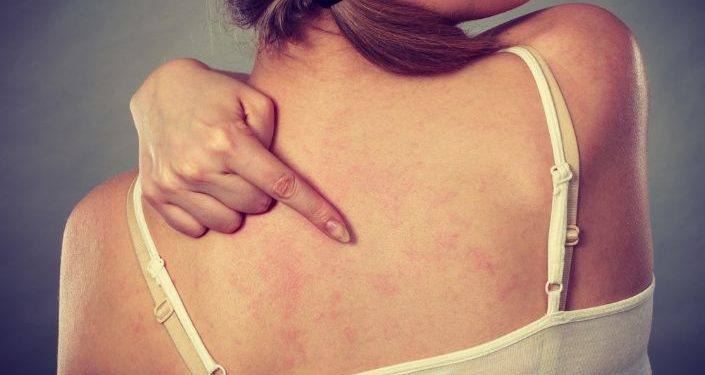There are different types of dermatitis, but they all cause skin to become itchy, dry, red and scaly. Itching can be so bad that you scratch it or break the skin, causing infection and leaving scars.
Itching is the most common symptom of dermatitis, but other symptoms may also be present. These include:
Rashes & Inflammation
Itchy, red and scaly patches of skin appear anywhere on the body. They can be scattered or clumped together, and sometimes they look like blisters. These rashes can also ooze fluid or bleed.
The skin of people with eczema becomes thicker than normal, and the rash tends to occur in areas that are prone to irritation, such as the scalp, hands, elbows, knees and ankles. This makes it hard to keep the area clean, and the itchiness can become chronic.
Often, a child with atopic dermatitis gets it when their immune system is not fully developed, or they are allergic to something that might be triggering the condition. Allergies can include food, animal dander, dust, pollen or other substances.
Eczema is most common in children and teens, but it can occur in adults as well. It’s usually not a serious health problem, but it can affect your self-esteem and social life.
Treatment for atopic dermatitis includes:
Topical medications, such as moisturisers, anti-inflammatory creams and corticosteroids, can help relieve itching. The medicine will reduce inflammation, and it can also speed healing of the rash.

Oral medications, such as diphenhydramine or hydrocortisone, can also be used to help control the itching. These medicines are available without a prescription.
Moisturizers, such as lotions with 12% ammonium lactate or 10% alpha-hydroxy acid, can also relieve itching and help moisturize the skin.
If you have atopic dermatitis, you should try to avoid things that can irritate your skin, such as hot showers or soap. You should also keep your stress level low and take steps to decrease exposure to allergens.
You can also try some natural treatments, such as tea tree oil and lavender essential oils, or dietary supplements that have been shown to reduce itchiness. But it’s important to talk with a doctor about any new treatment plan.
In addition, you should always make sure to use a soap or cleanser that’s gentle on the skin and unscented. If you need to use a moisturizer, apply it right after a shower or bath, and don’t overdo it.
Some rashes can be very uncomfortable, and they may interfere with your daily activities. If a rash causes you to feel itching so intense that it’s making you lose sleep or prevent you from going to work, you should talk with your doctor.
Atopic dermatitis can affect people of all ages, genders and ethnicities. It often develops in children, but can also occur in older adults and is more likely to happen in women than men.
A doctor can diagnose atopic dermatitis by taking a close look at the skin and talking to you about your symptoms. He or she will ask about your history of atopic dermatitis and other conditions. Then your doctor may do patch testing, which involves applying small amounts of various substances to your skin for several days. This helps to identify the exact type of allergy that is triggering your dermatitis.









